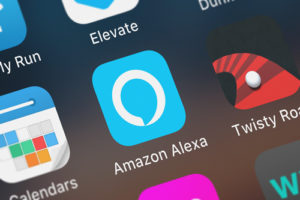As technology offers more ways to stay connected and access information, forward-thinking higher-ed leaders are leveraging voice technology such as Amazon’s Alexa to help students acclimate to campus life and feel like they’re at home.
That’s what happened last year at Saint Louis University (SLU), for instance, when the college deployed Alexa-enabled devices in every student room on campus.
Campus leaders had begun looking at voice technology as a way to help improve the student experience and personalize social and academic activities down the road.
Can voice technology increase student productivity?
A spring 2018 pilot with 20 Amazon Echo devices and 20 competitor devices yielded a firmer idea of how voice technology can help students become more productive, gain more access to information, and remain more engaged on campus, says David Hakanson, SLU’s CIO.
Related: How AI will shape the university of the future
After the pilot, campus leaders reviewed student feedback and realized the Echo devices could improve productivity. Through the university’s program, which is supported by Amazon Web Services, they built a university-specific skill to connect students with important campus information. For instance, instead of students having to pull up a browser on a mobile device to check campus library hours, they could simply ask Alexa and get an immediate answer. The seconds or minutes saved may not seem like much, but using voice technology for these purposes also caters to this generation of students’ desire for instant gratification while multi-tasking.
Making campus life a little easier
Students can ask Alexa about campus events and schedules, which goes a long way toward engagement, Hakanson adds. Resources like this are particularly useful; studies show that strong campus engagement leads to better grades and improved retention.
When new skills become available, the university emails students to let them know and to solicit feedback on the new and existing skills.
Voice technology in the classroom
The Echo devices, which are managed centrally, also are used in classes, and Hakanson says faculty could deploy department- or major-specific skills to specific groups of students in the future.
“We may find that there’s a skill specific to engineering students, so we could take that learning community and deploy the skill just to them; there’s a huge value proposition for being able to do more,” he says.
“As a university, we know a lot of these technologies are going to find their way on campus,” Hakanson adds. “How do we engage our students with this technology? They’re becoming much more accustomed to consuming information and performing tasks based off of voice commands. When we talk about productivity, we think that’s really why students want to use voice technology.”
Voice technology also has potential for faculty, he says. For instance, faculty may one day ask Alexa and avoid wading through a report in search of data.
“We think the voice technology is going to expand well past the student experience, and will help overall productivity for different user groups at the university,” Hakanson says. “That’s our true purpose as a university–to help students with their success.”
Other colleges embracing voice technology
“I’ve seen the technology disruptors, and when voice [technology] came out, I knew it was really one of the next disruptors,” says John Rome, Arizona State University’s (ASU) deputy CIO. “It was inevitable.”
ASU’s first foray into using Alexa’s voice technology for student services was in the form of 1,500 students in an engineering residence hall. The university powered Alexa with the information to answer roughly 500 ASU-specific questions.
Many students used Alexa for basic functions such as playing music, setting timers, looking up local information, and contacting family. But ASU also offered a program to help students learn how to build Alexa skills, and some engineering faculty members spent class time focusing on skill building for the devices.
“How do we train this next generation of students? They aren’t going to be only web developers or project managers–now there will be voice developers. We’ve placed ourselves in a position to [help train them],” Rome says.
The need for expertise in voice technology crosses multiple industries, he added, including the automobile industry, healthcare, and marketing fields, all of which are beginning to use voice to improve functionality and better meet consumers’ needs.
“We’re saying, ‘We want to be part of this new ecosystem and this new potential job market–how do we help prepare our students for it?'” Rome says. “This is part of the experience at ASU–exposing students to this technology.”
Privacy and security in a personalized age
Both universities hope to one day use Alexa to further personalize educational experiences for students. For instance, students might ask Alexa about the status of financial aid packages, grades, or course schedules.
But with more presonalization comes a concern about keeping sensitive student data and information private.
“We do see personalization in the future, and we want to make sure everything is in place from a security and privacy standpoint,” says Hakanson.
“We’re very cognizant of the privacy and security issues–that’s why we’re being thoughtful as we start doing more around Alexa personalization,” Rome says.
In the future, students could access sensitive information about classes or financial aid, but the challenge lies in multi-step user authentication.
“What is the best way to first authorize, then continue to authenticate, that particular student? Do we do it through voice, do we send something to a mobile device for verification? We’re being more intentional,” Rome says.
- Where are microcredentials today–and where are they going? - April 22, 2024
- First-generation students are more likely to seriously consider leaving college - April 17, 2024
- How higher ed can meet workforce needs - April 15, 2024

